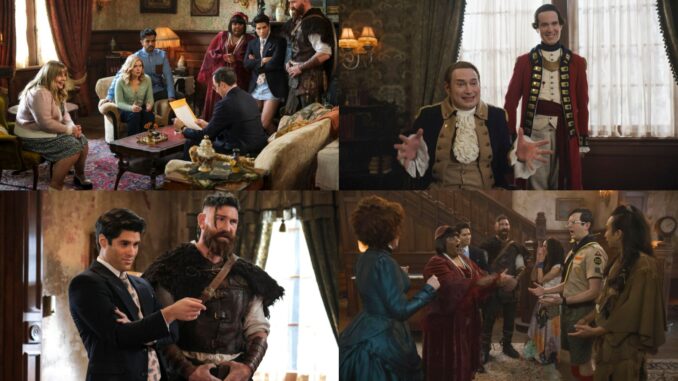
Ghosts: Stars Reveal the Balance Between Comedy and Real Emotion
"Ghosts," the American adaptation of the beloved British series, isn't just a sitcom about a young couple inheriting a dilapidated mansion haunted by a motley crew of spectres. It's a masterclass in tonal balance, deftly weaving laugh-out-loud comedy with moments of profound emotional resonance. And it's the show's ensemble cast of ghosts, each a star in their own right, who brilliantly reveal how this delicate balance is achieved.
The comedy in "Ghosts" stems from the inherent absurdity of the premise. Samantha and Jay, determined to transform their inherited mansion into a bed and breakfast, must navigate the chaotic realities of coexisting with ghosts from various eras. Their reactions, often exasperated and bewildered, are fertile ground for humor. However, the laughter doesn't come at the expense of the ghosts. Rather, it arises from the quirks and foibles of their individual personalities, rendered with such specific detail that they feel like real, flawed individuals trapped in an afterlife they can't quite comprehend.
Consider Hetty, the buttoned-up Victorian lady, whose prudish sensibilities constantly clash with the modern world. Her indignant pronouncements about "indecent" clothing or her bewildered attempts to understand technology provide endless comedic fodder. Yet, beneath the surface of her prim demeanor lies a deep well of longing for connection and a desperate need to maintain a sense of respectability. Episodes that delve into her past, revealing the societal pressures she faced and the sacrifices she made, offer poignant glimpses into the woman behind the rigid facade. Her moments of vulnerability, often expressed through subtle shifts in her posture or a softening of her voice, ground the comedy in a very real human experience.
Similarly, Alberta, the glamorous 1920s jazz singer, provides much of the show's flamboyance and wit. Her larger-than-life persona and unwavering confidence are a constant source of amusement. But her bravado is a shield, protecting her from the lingering pain of a life cut short and the unsolved mystery of her murder. When her insecurities are laid bare, when she allows herself to be vulnerable with Samantha, the comedic mask slips, revealing the raw emotion beneath. This vulnerability, juxtaposed with her usual theatricality, makes her character all the more compelling and relatable.
Even Isaac, the pompous Revolutionary War officer, a character initially defined by his inflated ego and repressed homosexuality, evolves into a more nuanced figure. While his outdated views and desperate attempts to regain his former glory often elicit laughter, his journey towards self-acceptance and his burgeoning romance with Nigel, the British officer, are genuinely heartwarming. His internal struggles, played with comedic timing and surprising sensitivity, highlight the show's ability to address complex themes with both humor and empathy.
What "Ghosts" does so effectively is avoid reducing its characters to mere comedic caricatures. Each ghost, with their individual backstory and emotional baggage, possesses a depth that allows the audience to connect with them on a human level. The writers cleverly interweave moments of levity with moments of genuine emotion, creating a dynamic that is both hilarious and surprisingly moving. The humor, instead of diminishing the emotional impact, actually enhances it by providing a necessary counterpoint to the heavier themes of loss, regret, and unfulfilled potential.
The show's success lies not just in its witty writing or the charming performances of its human leads, but in the ability of its ghostly stars to embody the delicate balance between comedy and real emotion. They remind us that even in the most absurd situations, there is always room for genuine connection, empathy, and understanding. "Ghosts" is a reminder that laughter and tears can coexist, and that sometimes, the most profound truths are revealed through the lens of comedy. It's a testament to the power of storytelling to explore the complexities of the human condition, even when those humans are, well, technically dead. And it's a compelling argument for the importance of finding humor in the face of life's challenges, both living and otherwise.